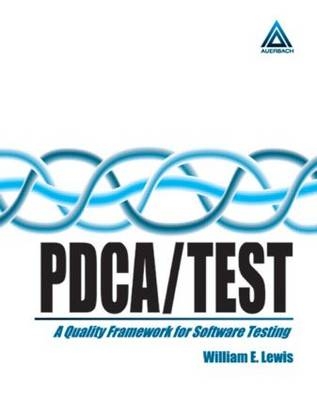
PDCA/Test
Auerbach (Verlag)
978-0-8493-9980-0 (ISBN)
- Titel z.Zt. nicht lieferbar
- Versandkostenfrei
- Auch auf Rechnung
- Artikel merken
Most manuals assume software testing is being performed as part of a well-defined, structured development cycle based on clearly stated requirements and standards. Unfortunately, this is not often the case in the real world. Indeed, the one true constant in software development is change.
PDCA/TEST presents a continuous quality framework based on Dr. Edward Deming's famous rapid application "spiral" development model for quality through a continuous improvement process to promote effective testing methods in both structured and unstructured environments.
William E. Lewis shows you Deming's spiral approach as an alternative to the traditional waterfall method. In the waterfall method, one set of predefined sequential steps is followed with clearly enumerated requirements. But the spiral approach is one where these rigid sequential steps may, to varying degrees, be either lacking or different as circumstances demand. Starting from this fundamental building block, Lewis shows you how to:
Apply the Plan-Do-Check-Act (PDCA) quality wheel to the software testing process
Integrate a continuous quality framework into all phases of software development, including requirements analysis, logical design, physical design, program unit design, and coding
And choose the right testing tool (such as Bender & Associates Softtest) for the right test.
The book also details the spiral methodology for software testing broken down into parts, steps and tasks documented with extensive checklists, templates, and technical discussions. You will also learn to:
Master black box, white box and gray box testing
Incorporate continuous improvement into inspections and walkthroughs
Verify the logical design, physical design, program unit design, and coding phases
And more.
In sum, PDCA/TEST: A Framework for Software Testing gives you all the tools and knowledge you need to assure quality software testing throughout all stages of development, no matter how unstructured that process may wind up being.
William E. Lewis is the president of a Texas-based computer consulting firm specializing in quality assurance software testing solutions and training. He is a certified quality analyst (CQA) and certified software test engineer (CSTE) sponsored by the Quality Assurance Institute (QAI), Orlando, Florida. He has a history of successful quality assurance experience in complex leading-edge environments. Over the years, he has presented several papers to conferences. In 1998 he presented a paper to QAI's Annual International Information Technology Quality Conference, entitled Spiral Testing, an excerpt from Section III of this book. Mr. Lewis has worked as an assistant director with Ernst & Young, LLP, located in Las Colinas, Texas. He joined E & Y in 1994 and authored the software configuration management, software testing, and application evolutionary handbooks, and participated in developing the Navigator/Fusion Methodology application improvement routemaps. He was the quality assurance manager for several application development projects and has extensive experience in test planning, test design, execution, evaluation, and reporting, and automated testing. Lewis has worked as a quality assurance analyst for the Saudi Arabian Oil Company (Aramco) in Jeddah, Saudi Arabia, the largest oil company in Saudi Arabia, on an overseas contract assignment as a quality assurance consultant for one year. His duties included full integration and system testing. He participated in the automated tool selection committee and made recommendations to management. He also created software testing standards and procedures. In 1998 Lewis retired from IBM after 28 years. His jobs included 12 years as a curriculum/course developer and instructor and numerous years as a system programmer/analyst and performance analyst. An overseas assignment included service in Seoul, Korea, where he was the software engineering curriculum manager for the Korean Advanced Institute of Science and Technology (KAIST), which is considered the MIT of higher education in Korea. Another assignment was in Toronto, Canada, at IBM Canada's headquarters, where he was responsible for upgrading the corporate education program. He has also travelled throughout the U.S., Rome, Amsterdam, Southampton, Hong Kong, and Sydney, teaching software development and quality assurance classes with a specialty in software testing. Prior to IBM, Lewis worked in the space industry. His first job out of college was with General Electric with the Apollo Support Department at the Kennedy Space Center as a real-time programmer. He also worked for another space company in that area as a real-time programmer in satellite data reduction, testing, and evaluation. He has also taught at the university level for five years as an adjunct professor. While so engaged he published a five-book series on computer problem solving. Lewis holds a B.A. in mathematics, and M.S. in operations research.
Introduction
Self-Assessment Questionnaire
Testing Basics
Systems Development Issues
The Testing Process
Testing Software Changes
Postimplementation Testing
Testing System Documentation
Prototypes
Testing Computer Security
Creating Tests
Using Testing Tools
Appendices
Exhibits
| Erscheint lt. Verlag | 30.11.1998 |
|---|---|
| Zusatzinfo | 111 Tables, black and white |
| Verlagsort | London |
| Sprache | englisch |
| Maße | 210 x 280 mm |
| Gewicht | 1640 g |
| Themenwelt | Mathematik / Informatik ► Informatik ► Software Entwicklung |
| Informatik ► Weitere Themen ► Hardware | |
| Technik ► Maschinenbau | |
| ISBN-10 | 0-8493-9980-7 / 0849399807 |
| ISBN-13 | 978-0-8493-9980-0 / 9780849399800 |
| Zustand | Neuware |
| Informationen gemäß Produktsicherheitsverordnung (GPSR) | |
| Haben Sie eine Frage zum Produkt? |
aus dem Bereich


